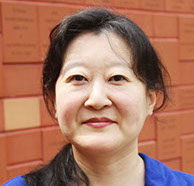How do sex workers decide where to ply their trade? How do they feel about other sex workers? And what do they do when they decide it is time to retire?
Dr Julie Ham has been posing these questions to sex workers in Vancouver and Melbourne, in research that seeks to fill a gap she identified after working with women’s rights organisations and migrant workers’ organisations in her native Canada. There, the stigma attached to sex work had created what she called ‘interesting tensions’ that stymied constructive discussion.
“With women’s organisations the discussions were very polarised between those who see sex work as exploitation and those who see sex work as work. With migrants’ organisations, there was a kind of silence about sex work,” she said.
Dr Ham therefore turned to the women themselves, interviewing 65 sex workers about their lives and attitudes for her book, Sex Work, Immigration and Social Difference published last year.
Many of the interviewees were of Asian-descent or other minorities, whom she felt were particularly susceptible to misperceptions. “There is a lot of mystique conjured up about this group of women. In anti-trafficking campaigns, for example, Asian women are portrayed as the exoticised ‘other’. It almost fetishises a perceived vulnerability or helplessness,” she said.
Needless to say, the women saw themselves in very different terms. They were largely in the sex trade by choice or because they could not find other work, and most of them were citizens or permanent residents of their countries, not temporary migrants. Many of them also liked their work or at least found it suited their lifestyles – some even decided to work within the vicinity of their children’s school, albeit at a discrete distance.
“What they’re concerned about is making money, keeping safe, supporting their families. So their goals are not all that different from any family’s goals,” Dr Ham said.
![]() What they’re concerned about is making money, keeping safe, supporting their families. So their goals are not all that different from any family’s goals.
What they’re concerned about is making money, keeping safe, supporting their families. So their goals are not all that different from any family’s goals. ![]()
Dr Julie Ham
Safety first
Safety nonetheless is a major concern to sex workers, but again, official prescriptions do not always line up with what the women want. Many of the interviewees felt safer when there were other sex workers nearby that they could rely on if there was trouble. They also viewed other sex workers largely as allies who could advise on such things as how to screen clients and what to charge (although a minority viewed other co-workers as risks to be managed or to keep at arm’s length).
But these relationships are complicated by legal regimes. In Melbourne the sex trade is legalised through a licensing framework. But in Canada, and also Hong Kong, sex work has an uncertain legal position: it is not illegal but the activities around it are often criminalised, for instance assisting a sex worker in their business. This makes it more difficult for workers to join forces.
Dr Ham has shared her findings with organisations and has a clear goal. “Our understanding of sex work must be grounded in workers’ day-to-day realities, so that rather than trying to imagine what workers are concerned about, we can find out from them what is going on,” she said.
On Hong Kong, Dr Ham, who came to HKU in 2015, has started a project looking at the concerns of non-Chinese sex workers here. She is also doing a project on domestic workers – “another gendered industry,” she said, in collaboration with the Asia Pacific Mission for Migrants.
Sex Work, Immigration and Social Difference is published by Routledge.
Rescue agenda
This was seldom recognised by organisations that purportedly wanted to help women, though. The starkest example concerned strategies for exiting the sex trade, which was the focus of another study by Dr Ham and Dr Fairleigh Gilmour at the University of Otago.
They found that sex workers wanted to be recognised as workers who are planning for their future. “Many of them conceptualised exiting the industry as an eventual career transition,” she said. But those who wanted to help them often had a different agenda.
“Most exiting interventions are ultimately based around the idea of rescuing women from the
industry – ‘we will swoop in and we will rescue you and then you will be safe.’ There are going to be problems if workers see it one way but the dominant social service model continues to develop programmes based on rescue. Because what that really says is that the worker can’t be trusted to make her own decisions.”
Organisations representing sex workers have been fighting against the rescue mentality in places such as Thailand and Cambodia, while acknowledging that trafficking in sex workers and women needs to be stopped. “Thinking that everyone in sex work is a victim and needs to be rescued is not going to stop trafficking,” Dr Ham said.

Working Hard
For A Living
Sex work as a job like any other is the focus of research by Dr Julie Ham in the Department of Sociology.


Sex Workers’ Rights Movement is a worldwide campaign to promote and protect sex workers' human and
labour rights.


